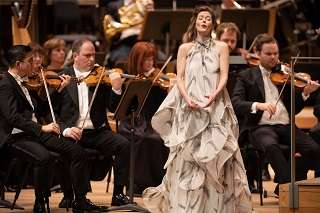|
Back
Barbara Hannigan Debuts with the Orchestre symphonique de Montréal (OSM) Montreal
Maison symphonique de Montréal, Place des Arts
12/07/2022 - & December 10, 11, 2022
Luigi Nono: Djamila Boupacha
Jean Sibelius: Valse triste, op. 44 No.1
Claude Vivier: Lonely Child
Hector Berlioz: Symphonie fantastique, op. 14
Barbara Hannigan (soprano)
Orchestre symphonique de Montréal, Rafael Payare (conductor)

B. Hannigan (© Antoine Saito)
Barbara Hannigan, icon of contemporary vocal music, made her OSM debut with two well‑chosen works of recent vintage, Djamila Boupacha by Luigi Nono, and Lonely Child by Montrealer Claude Vivier. Thus, contrary to what an OSM publicity photo might have led one to believe, Hannigan did not appear here conducting Berlioz’ Symphonie fantastique. As she explained in a recent interview, she prefers to take some time getting to know an orchestra before conducting it. After the highly appreciative reception she received on Wednesday evening, one can only hope she will return soon as both singer and conductor.
All the music on the program was in some way expressive of sadness or grief, yet the two halves could not have been more different in execution. The three 20th century works on the outstanding first half were played in quick succession without pauses in between. The program opened with the five‑minute Djamila Boupacha, sung from high in the organ loft. The text, taken from the poem Esta Noche by Jesús López Pacheco, was inspired by the suffering of the Algerian militant Djamila Boupacha, still alive at the age of 84. Hannigan, wearing a pale golden gown, funnel-shaped like the angel traditionally capping a Christmas tree, not only looked like an angel but sang like one. Singing in Spanish with laser‑like precision, Hannigan effortlessly spanned wide leaps, her divinely pure voice evincing not a touch of vibrato or strain. She held the capacity audience in the palm of her hand, and one could have heard the proverbial pin drop.
Next came Sibelius’ Valse triste. Payare conducted with delicacy and warmth, drawing lovely sounds from the strings and navigating the mood from bright to dark with subtlety and attention to detail.
Vivier’s Lonely Child was equally captivating. Parts of the text of this 17‑minute, semi-autobiographical work (influenced by the composer’s childhood in an orphanage) are in French, others are in a language Vivier invented himself as a child, a language that includes warbling effects created by the singer fluttering her hand in front of her mouth. Hannigan emerged discretely from the wings to join the orchestra after the music had begun. Her motionless stance underscored perfectly the ethereal opening. As the intensity of the music increased, so too did her physical gestures. The agony and distress in her voice were at times as one with the cacophonic sounds emanating menacingly from the orchestra. As with the Nono work, Hannigan sang with impeccable intonation, expressiveness, and effortlessness in handling the music’s wide dynamic range, from near inaudibility to screeching warbles. The audience responded with a thunderous standing ovation—a refreshing sight for challenging music composed in 1980.
In stark contrast, Berlioz’ Symphonie fantastique was a rushed and messy affair. Conducting without the score, Payare danced about the podium in a frenzy. With his legs splayed to the edge of the podium and arms waving high above his 1970s mop of hair, one could have taken him for a spider on speed. The performance showed scant attention to subtleties of dynamics or other details, resembling more a churning cauldron of chow than an elegantly-presented five‑course meal. One had to wonder whether this effort was little more than an attempt to woo the audience with a lot of noise. A disappointing conclusion to a concert that began gloriously.
Earl Arthur Love
|